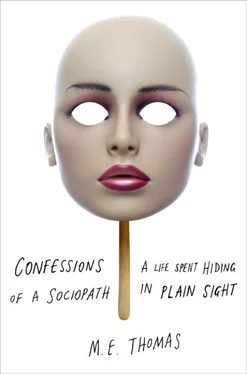It’s a classic chicken-and-egg dilemma that has prompted countless criticisms of the most popular diagnostic criteria. All diagnostic tools are based on the observable traits of people who have been diagnosed as sociopaths, which, apart from being rather circular, introduces the risk of biases that might skew which traits get included or not included. Of course there must be some starting place. Cleckley and others observed that some traits occurred more commonly in his patients than in the general populace. Once that recurring group of traits had a name, researchers could try to figure out if they all had a common cause, if they were related to other identifiable groups of traits, how many people had that group of traits, and what kinds of things those people got up to compared to the larger population. But Cleckley was well aware that his checklist was just his own poor approximation of the essence of sociopathy, and consequently was not infallible or even all-inclusive—a humility that I sometimes feel is lacking with researchers of sociopathy.
The current primary tool for identifying psychopaths (and, by association, sociopaths) is the PCL-R (Psychopathy Checklist–Revised), developed by Dr. Robert D. Hare, professor emeritus of forensic psychology at the University of British Columbia and generally considered the primary authority on criminal psychopathy. “Science cannot progress without reliable and accurate measurement of what it is you are trying to study,” Hare explains. With a research assistant he compiled a list of twenty traits that he noticed recurring among the prison population he was studying: lack of empathy and remorse, megalomania, manipulation, charm, self-interestedness, impulsivity, proficiency at lying, along with criminal-specific traits such as juvenile delinquency, revocation of conditional release, and criminal versatility. He instructed other psychologists giving the assessment to award two points if a trait was present, one if they were unsure or it applied somewhat, and zero if it wasn’t. The test was reliable, in that repeat assessments resulted in approximately the same score, but its validity has been heavily criticized.
Validity is a measure of how well a diagnostic tests what it is meant to test—in this situation, how accurately the PCL-R identifies psychopaths. The PCL-R has been criticized for being exclusively based on the prison population. Hare himself has admitted that it was done solely for convenience: “Prisoners are easy. They like meeting researchers. It breaks up the monotony of their day. But CEOs, politicians …” In a widely publicized scandal, Hare threatened to sue two psychologists who warned in a paper that the checklist was increasingly being mistaken for a complete definition of psychopathy, which is a broader personality construct that includes deceitfulness, impulsivity, and recklessness, but not necessarily physical aggression or illegal acts. The authors contended that Dr. Hare’s checklist warps that concept by overemphasizing criminal behavior. Their article reflects the growing consensus that sociopathy does not equate to criminality. Nor has Hare defended why each trait on the checklist is scored exactly the same. It’s not immediately obvious why a trait like lack of empathy should earn exactly as many points as something seemingly less significant like superficial charm. There is also the question of what defines this (or any) personality disorder, a person’s actions or her interior motivations. While a case history of bad decision-making is easy to evaluate, it’s harder to truly understand another person’s modes of thought.
There are significant differences of opinion among academics and clinicians about whether psychopathy and sociopathy are diagnosable conditions at all. The good folks at the American Psychiatric Association who put together the DSM have decided to exclude both terms, despite movements by researchers for revisions in favor of antisocial personality disorder, or ASPD, a diagnosis based on observed behavioral patterns. The World Health Organization’s International Statistical Classification of Diseases and Related Health Problems describes a similar diagnosis it calls dissocial personality disorder but also does not include sociopathy. ASPD and sociopathy do not share all of the same characteristics; ASPD focuses primarily on the criminality of behavior, rather than the internal thought processes of a sociopath, since thought processes are difficult to ascertain, particularly with unwilling, institutionalized subjects. For instance, although I consider myself a high-functioning sociopath because of my weak sense of empathy, my failure to conform to social norms, and my predilection to manipulate others, I could not be legitimately diagnosed with ASPD.
Further confusing the diagnostic problem of sociopathy is the overlap in behavioral characteristics between sociopathy and other personality disorders such as narcissism, like enhanced self-regard and diminished empathy, as well as some social developmental disorders like Asperger’s that are also seen on the autism spectrum.
In his book Forensic Psychology: A Very Short Introduction , David Canter, a psychology professor at the University of Huddersfield, warns that “we should not be seduced into thinking that these diagnoses are anything other than summary descriptions of the people in question” and echoes the concern that they are “actually moral judgments masquerading as medical explanations.” The first line in the preface of Robert Hare’s book reads: “Psychopaths are social predators who charm, manipulate, and ruthlessly plow their way through life, leaving a road trail of broken hearts, shattered expectations, and empty wallets.” So you can imagine what side of the fence he’s on. Still, these diagnoses are being used, and important decisions like whether or not to deny someone parole are made primarily on the basis of them.
Unlike the problematic definitions of psychological diagnoses, neuroscience may offer some more clarity. Recent brain scan research and other studies suggest a link between these characteristics and something more “definitive” and unique about a sociopath’s brain. But it would be a mistake to conflate the list of characteristics of a sociopath with the definition of sociopath , just as it would be a mistake to assume that all Catholics would share the exact same traits—or that having a certain list of traits is what makes people Catholic. The diagnosis of sociopathy is useful, but only to the extent that people understand its limitations. The main limitation is that we cannot identify it by its root source; we know it only by its symptoms and characteristics. This is somewhat disappointing to people. It would be easy to think that I am bad because I was treated badly or raised badly, that I grew up in an environment devoid of love and filled with enmity. But I didn’t suffer the kind of outrageous abuses that so many people do. Mine were of the ordinary variety, maybe some benign neglect. When people ask me whether I had a bad childhood, I tell them that it was relatively unremarkable. We know from twin studies that there is a strong genetic component to sociopathic traits, and we also know that sociopaths have different brains from most people. But just because they have different brains does not mean that their unusual brains are what makes them act differently. The fact that they act differently could actually be affecting their brain circuitry. Similarly, just because a sociopath’s brain is different does not mean that is what is causing the sociopathy—that could be, according to Hare, a “by-product of some other environmental or genetic factor commonly found among psychopaths.”
We don’t know the root cause, but we also know there isn’t a cure for this disorder, not that we would necessarily want one, for reasons that I hope will be clear upon finishing this book. Dr. Cleckley observed and counseled sociopaths as a psychologist and professor at the Medical College of Georgia. He wrestled with how to treat sociopathic patients and criminals, whom he believed to be deeply disturbed but essentially intractable. In the preface to his final revision of The Mask of Sanity , which he wrote at the very end of his life, Cleckley explained that he had been unable to discover an effective treatment but was heartened by the belief that he had contributed to the understanding of sociopathy—and especially that the relatives and loved ones of sociopaths could have some explanation for the unusual behavior of their beloveds. Indeed, he cited at length instances of incurable patients—individuals who had all the resources and support in the world to get better but ended up maiming significant others and committing other manner of misdeeds. To him we were a lost cause.
Читать дальше












